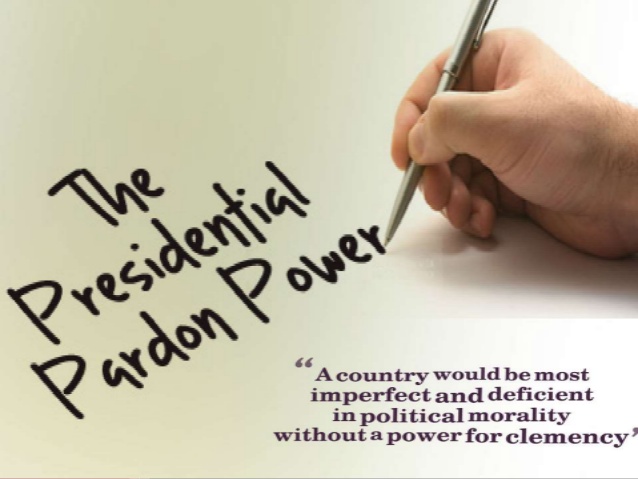This article is written by Prabha Dabral, from IMS Unison University, Dehradun. This article deals with the pardoning power of the President and its need in the present scenario.
Table of Contents
Introduction
The literal meaning of the term ‘pardon’ is to forgive someone for his or her fault. Pardoning or giving mercy can be seen as a constitutional scheme too. In the Indian Constitution, this power to grant mercy is enjoyed under Article 72 and Article 161 by the President and the Governor, respectively. It is an executive or the government’s decision to grant a pardon under which a convicted person is allowed to be freed of all the criminal charges they are accused of. It even removes all the police records against that person. This means that the power of pardoning brings a person back to their original position of innocence as if they had never committed the offence. It has now become an integral part of the executive function of every country because of its requirement in the system.
The concept of granting a pardon has proven to be effective as it allows the convicts to start afresh. The former Supreme Court judge, Markandey Katju has remarkably described how exercising the pardoning power benefits all. He said that the philosophy of punishment rests on four principles. Fistly, It can be a deterrent by creating fear in the minds of convicts. Secondly, it can be retributive by making the person pay for it. Thirdly, it can be preventive by stalling a crime, and lastly, it can be reformative by helping the person strengthen their human character. The theory of reformative punishment works inevitably behind clemency or mercy. In 2005, APJ Abdul Kalam wrote the same thing in the Govindasamy case: Law is also “a medium of reform.”
The power to pardon criminals – speaking from the statute
Article 72 of the Indian Constitution talks about the pardoning powers of the President. The President has the power to pardon, respite any punishment, and remit or commute the sentence of any person convicted of an offence. All those persons can apply for pardon who are convicted of any offence-
- Where the punishment or sentence is given by a court-martial. A court-martial is a judicial court that adjudicates the offences committed by armed services’ members against the military law;
- Where the punishment or sentence is given for an offence related to a matter over which the union has the power to make law;
- Where a death sentence is awarded to the convict for their offence.
Similarly, under Article 161, the Governor of a State enjoys the same power of pardoning, remissioning, and commuting the convicts except for the power of granting pardon to a person who is awarded a death sentence or who is awarded punishment by court-martial.
Types of pardoning
There are five different types of pardoning-
Pardon
When the President grants pardon to a convict, the conviction, sentence and disqualifications of the convict get absolved. They live like a normal citizen without any criminal record.
Commutation
When the President uses their pardoning power of commuting they substitute one form of the punishment for a lighter one. For example, rigorous imprisonment may be commuted to simple imprisonment.
Reprieve
The President chooses this type of pardoning power, especially in cases of death sentences. In this, they stay the execution of a sentence for a temporary period. This enables the convict to have time to apply for pardon or commutation from the President so that the convict can prove their innocence or successful rehabilitation.
Respite
Respite is a type of pardon in which the President chooses to reduce the degree of the punishment due to special circumstances. The special circumstances may include facts about the convict due to which they must not be awarded a harsh punishment. For example, circumstances like a physical disability or pregnancy of a woman convict.
Remission
In this type of pardon, the nature of the sentence remains the same but the period of the sentence is reduced. For example, rigorous imprisonment of ten years may be remitted to two or three years but the nature of the imprisonment remains rigorous.
The grounds on which pardoning power can be exercised
Following are the grounds for exercising pardoning power-
- Sometimes, pardons are offered to those persons who are convicted wrongfully.
- It is granted to those individuals who have paid their debt to society or if they are considered to be deserving.
- It is granted to free someone in case of a flawed judicial process. For example, in cases where persons are given harsh punishments that appear to be disproportionate.
A look into different instances when the President has used their power
There are many instances in Indian history where the President has used their power. In the year 2005, a total of 1,241 death sentences were commuted into life imprisonment. In Indian history, Pratibha Patil (2007-2012) was the first President to use power to pardon death-row inmates. Her last pardon was given to Sushil Murmu. He was guilty of the crime of sacrificing a nine-year-old boy in a ritual sacrifice for prosperity to Goddess Kali in 1966. The Supreme Court, in this case, held that this is the most exemplary case and must be treated as the ‘rarest of the rare’ cases in which death should be the rule. Despite the remarks of the Supreme Court, the convict was granted a pardon.
In the year 2012, President Pratibha Patil had granted 30 pardons of which 22 of them were related to brutal crimes. Many criticized Patil’s act of putting mercy on trial. She had pardoned even those criminals who had shocked the conscience of the Supreme Court. But the court had no choice but to accept it. There have been cases too where Patil thought it fit to reject the petitions. One of them was the mercy petitions of 3 convicts who were involved in the killing of the former Prime Minister Rajiv Gandhi.
Other Presidents like President Abdul Kalam (2002-2007) disposed of two mercy pleas. President Pratibha Patil (2007-2012) rejected only five out of 34 mercy pleas. President Pranab Mukherjee (2012-2017) had granted the pardon in only four cases out of 34 mercy pleas. The 14th and the current President of India, Shri Ram Nath Kovind has been strict in using the power to pardon criminals. The first mercy petition that was to be decided by him was of a murder convict in Bihar. Moreover, he has rejected the plea of Tamil Nadu’s government to free the prisoners who are convicted for the assassination of Rajiv Gandhi, the former Prime Minister.
The need for the presence of the power
The Supreme Court is the highest judicial court in the country. This is the Court of last resort for a person seeking justice and thus, people have high hopes from this court. But it is still a human system of judicial administration which can not be completely free from imperfections. Even after a case is decided by carefully examining all the evidence and taking so many precautions, there is still a possible chance of judicial error. In some cases, innocent persons are being punished due to miscarriage of justice. It can happen because of some false evidence or the carelessness of the prosecution. This situation can be rectified only by granting a pardon. So, pardoning gives them hope for justice. It was realized in some cases that human judgement is not free from personal prejudice and requires further revision. This is why the harsh punishments need a second consideration before it’s implementation. Even the administration of justice is not necessarily always wise, so pardon is a check entrusted for special cases.
Not only this, but the hope of being pardoned itself serves as an opportunity for the convicts to behave themselves in the prison. This solves the issue of prison discipline too. This further leads to reformative and changed behaviour of the convicted person. Moreover, the concept of pardon yields positive results and has improved a man’s belief in society’s nobility and its laws. Thus, this concept is necessary.
Reasons to retain the power to pardon
There are plenty of good reasons for the Indian Constitution to retain this power. They are-
- Judiciary is a human system and is not infallible. Judges are human beings and can make mistakes. Hence, the Constitution needs a protective law that can protect in case of failure of the judicial system.
- There will always be cases when a person is rightly convicted but the punishment so awarded appears to be disproportionate. The punishment given may not look justifiable because of the extenuating circumstances and the lowering of the sentence may seem fit. For instance, the Chelsea Manning Case (2013) of the United States of America (USA). In this case, Manning had leaked secret government documents. As a punishment, the military court awarded a 35 years sentence to him. A few days before the end of his term, former President Barack Obama commuted the sentence and set him free.
- The more compelling reason for its need is that in the life of every nation, there comes a time when the crimes and convictions have to be ignored so that the wounds of the society can be healed. For instance, In the 19th century after the American Civil War, President Abraham Lincoln pardoned most of the soldiers who fought for the confederate. The public and the administration were in disapproval of Lincoln’s decision to pardon and said he was lenient.
In the year 1974, when US President Richard Nixon had resigned in the aftermath of the Watergate scandal he was pardoned by his successor President Gerald Ford because, at the time when the country was facing too much economic and security crisis, a trial of the former President would cause too much political turmoil.
How Presidents use their power
There is no such statutory written procedure for writing mercy petitions in India. A convict or his/her relative, after extinguishing all the reliefs in the court of law, may submit a written petition to the President under Article 72 of the Indian Constitution. The President’s Secretariat receives the petition and then forwards it to the Ministry of Home Affairs. After the consultation and discussions upon the petition’s merit made by the Home Minister and the Council of Ministers, the petition is sent back to the President for his decision. Then as per the statute, the President of India can exercise his right of granting pardon. In a case, Maru Ram v. Union of India (1980), the Supreme Court made it clear that the pardoning power of the President must be exercised after taking advice from the Council of Ministers.
In case the President rejects the petition, he may need not give any reason for such rejection. This was observed in the Ranga Billa case, in which the nature and ambit of the pardoning power were to be decided. In this case, the accused was awarded the death sentence and his mercy petition was also rejected by the President. The appellant then filed a writ petition in the Supreme Court that no reasons were given for such rejection. The Court dismissed the petition and observed that pardon in itself is a discretionary remedy and whether it is granted or rejected it need not be reasoned. There is a condition that a President has to comply with while deciding to use this power. He has to examine the case before granting a pardon thoroughly. In the year 2005, the former President APJ Abdul Kalam started considering the mercy petition of Govindsamay in a positive light when he found out that there were no eyewitnesses to the murder that he had committed. In the case Kehar Singh v. State of UP (2009), it was held that the President, while using his power to pardon, must examine the merits of the case himself before granting pardon.
Just like India, the other countries also enjoy this power. They find the concept of pardoning criminals to be essential and the countries which do not have this power are considered imperfect and lack political morality. A criminal justice system is there in every country and the object behind punishing a criminal is to maintain public welfare, so is the object of the pardons, i.e., maintaining public good. Granting a pardon frees a convicted person and gives an opportunity to a person to start a fresh life. The person may improve their human character due to forgiveness.
In countries like the United States of America (USA), the President has the similar power of pardoning the criminals but only in case of violation of Federal law. In the case of violation of state law, the power to grant pardon is with the governor of the state concerned. Moreover, the US President is not given this power to grant reprieves and pardons in case of impeachment. In the US, neither Congress nor the courts can take away the President’s power to pardon. There is only one limitation i.e. in the case of impeachment.
In Canada, this power is given to the National Parole Board under the Criminal Records Act. In the United Kingdom (UK), the power is vested in the Constitutional monarch but on the advice of the council of ministers, i.e., the Secretary of State within England and Wales, the first minister of Scotland, or the Secretary of Northern Ireland. In the case of the convict of Armed Forces, the advice will be given by the Secretary of State for Defence. In England, legislative power can not control or limit the power to pardon. Though, there are certain limits on using the discretionary power to pardon.
The possible loopholes surrounding it and the solutions available for the same
The power of pardoning is an extraordinary power given to the executives. So, there is a fair chance of exercising this power arbitrarily, or with mala fide intention. In a case, Swaran Singh v. State of UP (1998), the Minister of State Legislative Assembly was convicted for the offence of murder. After submitting the mercy petition, the Governor of UP granted remission of life sentence to him. Later, the Supreme Court interdicted the Governor’s order and held it to be arbitrary. Due to such cases, there is a need for the power of pardon to be subjected to judicial review.
In a landmark judgement, Epuru Sudhakar and Anr v. Government of AP and Ors (2006), the Supreme Court held that a limited judicial review of the exercise of clemency power is given to the courts. It even gave the grounds under which granting of clemency by the President or Governor can be challenged. Following are the grounds-
- The order is a malaise.
- The order has been passed on extraneous considerations.
- Relevant material has been kept out of consideration.
- The order suffers from arbitrariness.
However, with the passage of time, the power of pardon has become impure. There can be a huge abuse of power. For example, in cases where pardon is only granted to big politicians, businessmen, and powerful people. But if one looks at the benefits that this power provides. This power of the executive is significant as it corrects the errors of the judiciary. Moreover, this power is often criticized on the basis of the doctrine of separation of power. Some say that the pardoning power is a violation of this doctrine. The purpose of this doctrine is to prevent the abuse of power by a single person. It restricts any of the organs of the government to become all-powerful because absolute power tends to corrupt. Nonetheless, the power of pardoning criminals is not absolute because the President is allowed to use this power only on the advice of the Council of Ministers. Though under Article 72(1), he can return it for reconsideration just once.
Conclusion
Our criminal justice administration system is based on a certain belief that ‘Let a hundred guilty be acquitted but one innocent should not be convicted’. Hence, chances must be given to the convicted person.
When a convict has extinguished all their reliefs in the court of law, does this means their life has ended, and so do their rights? The answer to this is ‘No’. When the highest court has convicted a person, that person still has the right to prove their innocence or their successful rehabilitation. They can take their last constitutional resort by filing a mercy petition to the President of India.
The process of granting a pardon is simple, but its disposal is delayed due to the lethargy of the government. In some cases, its power is being abused due to the involvement of politics. There is a need to have an amendment to the pardon law to make sure that mercy petitions are disposed of quickly. There is a need to bring changes in the method of exercising this power to prevent its abusive use.
References
- https://www.legalbites.in/analysis-judicial-review-pardoning-power-president-governor-india/
- https://www.indiatoday.in/india/north/story/afzal-guru-sc-seeks-records-death-row-convicts-mercy-pleas-93903-2012-02-22
LawSikho has created a telegram group for exchanging legal knowledge, referrals, and various opportunities. You can click on this link and join:
https://t.me/joinchat/J_0YrBa4IBSHdpuTfQO_sA
Follow us on Instagram and subscribe to our YouTube channel for more amazing legal content.
 Serato DJ Crack 2025Serato DJ PRO Crack
Serato DJ Crack 2025Serato DJ PRO Crack











 Allow notifications
Allow notifications


